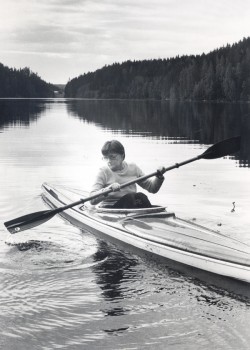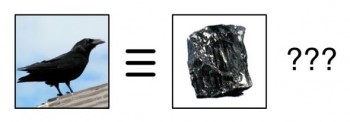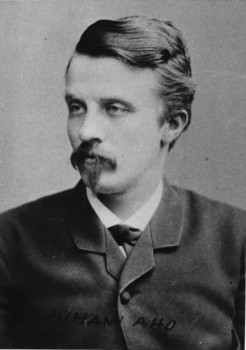Search results for "herbert lomas"
New from the archives
13 March 2015 | This 'n' that

Eeva-Liisa Manner. Photo: Tammi.
Today we have a real treat – a selection of the sumptuously minimalist poetry of Eeva-Liisa Manner (1921–1995) by her near-contemporary, the British poet Herbert Lomas (1924–2011).
Born in Helsinki, Manner spent her youth in Viipuri, in what was then part of Finland; her life was, like Eeva Kilpi’s, marked by evacuation from her home and the subsequent loss of Karelia to the Soviet Union in the Second World War. Her breakthrough collection, Tämä matka (‘This journey’, 1956) marked a major arrival on the modernist poetry scene and her work has been widely translated. Always lyrically minimalist, Manner’s poetry sometimes seemed to approach the limits of language – silence:
The words come and go.
I need words less and less.
Tomorrow maybe
I’ll not need a single one,
she wrote in Niin vaihtuvat vuoden ajat (‘So change the seasons’), as early as 1964.
Lomas brought to the delicate, beautiful textures of Manner’s poetry with its themes of grief, suffering and loneliness a bluff Yorkshire, and entirely masculine, sensibility. For him, Manner had a ‘splendid sanity’ and sense of humour; hers was an oeuvre ‘that heals by listening and recovery’.
Manner’s work has more recently been translated by another English writer, Fleur Jeremiah, in a volume entitled Bright, dusky, bright (Waterloo Press, 2009). A sample of the approach taken by a woman of a different generation can be found here.
*
The digitisation of Books from Finland continues apace, with a total of 360 articles and book extracts made available online so far. Each week, we bring a newly digitised text to your attention.
The Comb
30 September 1981 | Archives online, Fiction, Prose
A short story from Tilanteita (‘Situations’, 1962). Introduction by Vesa Karonen
The young man’s comb dropped behind the radiator under the window. The young man crouched down to look and felt with his fingers in between the pipes and along the floor. No trace of the comb.
Lose something on a train and it eludes you. A train ticket I left once – just placed it long enough on the window ledge for it, too, to fall behind the radiator. Couldn’t find it. The conductor came along, said “Any new fares! Tickets please.” I just sat still, totally unconcerned, until he’d gone. I’m sure there are little details which give the game away to conductors, they know who’s just got on.
New passengers are always somehow fresher, more alert. In winter, I hear, they look at the passengers’ feet. If there’s snow round the edges of the shoes, no need to hesitate. A lot of people are done for by looking straight in their eyes. Offenders always look straight back and then in the middle try to look somewhere else entirely. I was careful not to look steadily into the conductor’s eyes. It was easy when I concentrated on the way the long ventilator cords swung back and forth from the ceiling. They all swung in the same direction but some cords were a bit behind the others. Perhaps it was because the cords were all slightly different in weight and length. Now I remember – it’s not the weight that counts, just as it’s not weight that affects the way a pendulum swings. When the conductor had gone I began to look for my ticket again. I went on looking for it all the way to Tampere. The young man, too, would obviously go on looking for his comb until he got where he was going, without finding it. More…
Troubled by joy?
30 September 1998 | Fiction, poetry
Poems from Boxtrot (WSOY, 1998)
Nine lives
So far nine lives only, and
all mine, like my head in my hands.
My first was curled up at the foot of a fir tree
in the autumn forest just at day-dawn
in nighttime's raindrops.
The resin's still in my fingernails.
My second was the scent of split wood by the shed,
and the circular-saw blade's horrific disc.
The gruel, track shoes too large, and President Kekkonen,
ink spreading across my notebook, and
the clank of the railway under my dreams.
Mayday's red flags, the neighbour's daughter
naked, and dead pigeons lying on the gravel.
My third life was the discovery of anger, blind rage
turning and turning me in its leather bag,
wearing the edges of my day down. Sitting at our schooldesks
being forced towards a goal that can't be named.
Seeing how they start drinking, drinking
into their eyes that black impotent rebellion.
I'm on the point of drowning, someone's traversing
the Atlantic in a reed boat. And if I did die,
it wouldn't matter who sneered. The stars in the sky
are watching us in horror.
Looking back on a dark winter
31 December 1989 | Archives online, Fiction, Prose
Extracts from the autobiographical novel Talvisodan aika (‘The time of the Winter War’), the childhood memoirs of Eeva Kilpi. During the winter of 1939–40 she was an 11-year old-schoolgirl in Karelia when it was ceded to the Soviet Union and the population evacuated
Time is the most valuable thing
we can give each other
War’s coming.
One day my father comes out with the familiar words in a totally unfamiliar way, while we’re sitting round the kitchen table eating, or just starting to eat.
He says to mother, as if we simply aren’t there, as if we don’t need to bother, or as if listening means not understanding. Or perhaps they’ve simply no other chance to speak to each other, as father’s always got to be off hunting, or on his way to the station, and mother’s always cooking. More…
One night stand
31 March 1987 | Archives online, Fiction, Prose
Stories from Yhden yön pysäkki (‘One night stand’, 1985) and Unohdettu vartti (‘The forgotten quarter’, 1986). Introduction by Pekka Tarkka
At the beginning of November it really started to freeze. A month earlier than usual. There was little snow to speak of, but the ground froze hard as bone.
Tamed by hunger, reindeer clustered along the roadsides and on the village outskirts. Many of them ended their misery by flinging themselves under the timber-lorries in the evening dark. Bony and bloody carcasses littered the ditches and field-edges.
Then the snowstorms came. It snowed without stop for nearly two weeks. At times the whole landscape was reduced to a white line. Snowdrifts mounted round the houses and up the snow fences. The reindeer carcasses lay about under the snowbanks, waiting for spring. More…
Brief lives
30 September 1989 | Archives online, Fiction, Prose
Rosa Liksom’s characters live in the tiny villages of empty Lapland, speaking a dialect that rings oddly in the ears of the southern Finnish majority; or they may inhabit anonymous towns, but there, too, life is full of the anguish of existence. Liksom, whose black comedy can be compared with that of the Danish writer Vita Andersen, is able to cram into her short texts complete life histories, bizarre, comic or tragic. Her first volume of short stories, Yhden yön pysäkki (‘One night stand’) appeared in 1985; the following short stories are from Tyhjän tien paratiisit (‘Paradises of the open road’, 1989)
We got hitched up the 14th of November and by the end of the month it was all over. As far as I’m concerned call it a marriage exactly two weeks too long. We hadn’t set eyes on each other till the Pampam that’s the place me and the girls go after work for a drink and I was sitting there having one with them when who comes through the door but this bloke and it hits me. That bloke’s for me. In the end I went over to his table and said up yours stud. We went over to my place to bunk down and after that I couldn’t get the sod out. The bloody shitbag got his claws into me and hung on just on the strength of that one night. He glued himself to my bed. Lay there flat out when I set off to work and shit he was still there when I came back only arse up this time. More…
L’Amour à la Moulin Rouge
Extracts from the novella Yksin (‘Alone’, 1890). Introduction by Jyrki Nummi
After dining at the Duval on the Left Bank I take the same route back and drop in at the Café Régence to flick through the Finnish papers they have there.
I find my familiar café almost empty. The waiters are hanging about idly, and the billiard tables are quiet under their covers. The habitués are of course at home with their families. Anyone who has a friend or acquaintance is sharing their company this Christmas Eve. Only a few elderly gentlemen are seated there, reading papers and smoking pipes. Perhaps they’re foreigners, perhaps people for whom the café is their only home, as for me.
A little way off at the other end of the same table is a somewhat younger man. He was there when I came in. He’s finished his coffee and appears to be waiting. He’s restless and keeps consulting his watch. An agreed time has obviously passed. He calms himself and lights a cigarette. A moment later I can see a woman through the glass door. She’s hurrying across the street in front of a moving bus and running straight here. Now the man notices her too, and he cheers up and signals to the waiter for the bill. The woman slips through the door and goes straight across to him. They altercate for a moment, come to an understanding and depart hand in hand. More…
An evening with Mr Popotamus
31 March 2004 | Archives online, Fiction, Prose
‘Hippopotamus’, a short story from Kävelymusiikkia pienille virtahevoille (‘Passacaglia for small hippopotami’, Tammi, 1958). Introduction by Tuula Hökkä
Someone came gasping up behind me at high speed, stopped, and thrust a bundle under my arm, whispering hoarsely and agitatedly: ‘Keep hold of this, hide it! They’re after me –’ And before I’d woken up to what was going on he’d disappeared round a corner.
I was holding a warm living creature, a hippopotamus. Presumably stolen from some zoo or some private person who loved hippopotami; perhaps the man was a sailor and had brought the animal from abroad.
However it was, the hippo needed a safe place. I decided to take it home; I’d had cats and dogs, hadn’t I? – and once a little marmot. I’d always longed for a giraffe. OK, a hippo was just as good. After all, I could put an ad in the paper later: ‘Found: a hippopotamus. Hippo returned on production of identification marks.’ More…
Encounters with a language
12 December 2014 | Articles, Non-fiction

Mistranslation: illustration by Sminthopsis84/Wikimedia
Mother tongue: not Finnish. How do people become interested enough in the Finnish language in order to become translators? In the olden days some might have been greatly inspired by the music Sibelius (as were the eminent British translators of Finnish, David Barrett or Herbert Lomas, for example, back in the 1950s and 1960s). We asked contemporary translators to reminisce on how they in turn have become infatuated enough with Finnish to start studying and translating this small, somewhat eccentric northern language. Three translators into English, one into French, German and Latvian tell us why
The house in Silesia
31 December 1989 | Archives online, Fiction, Prose
A short story from Talo Šleesiassa (‘ The house in Silesia’, 1983). Read the interview
We set off, my brother-in-law and I, at the beginning of September. The tourist season was already over, and on the Gdansk ferry there was stacks of room for my brother-in law’s Volvo and the two of us.
We’d driven from his home on the shore of Lake Mälar to the ferry port at Nynäshamn, about fifty miles south of Stockholm. We’d driven in an atmosphere of cheerful resolution, accelerator down, but going steadily. The resoluteness was due to my brother-in-law’s decision after forty years’ absence to visit his childhood home. If it was still standing, that is – or whatever of it was.
‘Oh the house is definitely still in place there all right,’ he said: ‘I’ve got that sort of tickly feeling in my arse.’ It was a direct translation from the German – German humour of the vulgar variety centring round the bottom. More…
Coming up…
23 June 2011 | This 'n' that

Juhani Aho. Photo: SKS/Literary archives
After having read Juhani Aho’s sensual novella Yksin (‘Alone’, 1890), set in Paris, composer Jean Sibelius threatened to challenge its author to a duel.
The yearned-for loved one in the novella resembled Sibelius’s fiancée Aino Järnefelt, for whom author and journalist Aho had nursed an unrequited passion. (No duel ensued after all.)
This year marks the 150th year since Aho’s birth. An early modernist, Aho (1861–1921) was a versatile writer whose narrative skills have made him a classic. We shall feature extracts from Yksin – in Herbert Lomas’s translation, first published in Books from Finland in 2006 – along with a reappraisal of Aho’s work in the early years of the 20th century by Professor Jyrki Nummi.
Poems
31 March 1979 | Archives online, Fiction, poetry
Poems from Lähdössä tänään (‘Leaving today’, 1977) Introduction by Jouko Tyyri
1
‘The wind’s speaking.’ If the wind were really speaking
could we endure its words
so void, flinty, so groping?
Inside them
they have
salt, horror,
mania: a long-drawn black speechless
roller that wipes the coast clean
of houses, woods, junk. It swashes
your eyes. If I’d had some
feeling. Or thought. If
I was something. If I was I.
It’s gone.
There’s nothing here. Only a draught.
The air moving back and forth, soon to drop.
2
Orlando di Lasso's melodies
airy, without a touch of soil
a little dust on
as much as might be on a butterfly's wing
only just so much
Orlando himself, four hundred years
remoulded into loam, coalesced with dust
just like you, you, just like you More…
